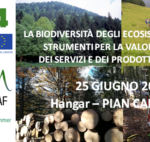10th IALE World Congress
1-5 July 2019; Milano, Italy
THE DEADLINE FOR THE SUBMISSION OF ABSTRACTS HAS BEEN POSTPONED TO FEBRUARY 25 2019
Nature and society facing the Anthropocene: challenges and perspectives for landscape ecology
The congress is an international meeting opportunity for everyone working with landscape ecology or who has an interest in the field. IALE 2019 will be an excellent opportunity to learn more about the latest in landscape ecology, to discuss with people from all over the world, to share your work and to learn from others. We expect participants from a wide range of countries and so invite you to add your ideas and energy to the mix. From the congress we aim to build a relevant network among environmental NGO’s , civil society associations, universities, local authorities as well as institutions from any level.
Some of the proposed symposia:
Deciphering environmental gradients in landscapes for a better understanding of biodiversity dynamics
For quantifying and modelling of landscape patterns, the patch matrix model (PMM) and the gradient model (GM) are the fundamental concepts of landscape ecology. While the PMM model has been the backbone for our advances in landscape ecology, the GM represents a continuous landscape characteristic, which provides crucial insights into pattern-process- functionality interactions. Read more
The importance of coppice forests for landscape diversity and the factors influencing the proportion and distribution of young growth stages
COST Action FP1301 ‘EuroCoppice’ Innovative management and multifunctional utilization of traditional coppice forests – an answer to future ecological, economic and social challenges in the European forestry sector has established the extent, status, continuing importance and potential for development of coppice as a management system for broadleaved woodlands across Europe.
Modeling the structure and functioning of forest landscapes under changing climate and disturbance regimes
Forest ecosystems and their products and services play an important role to achieve ambitious climate change mitigation, but also have to adapt to climate change. The increasing demand for climate change mitigation and adaptation as well as the contribution of forests to a bio-based economy, sustainable development and biodiversity targets will lead to massive changes in forest management and forest resource use. Process-based forest models can assess the future provisioning of forest products and ecosystem services by simulating different management options allowing to assess the production of wood products, biomass, and regulatory services while forecasting changes in forest resilience under climate change.
Visit the official web site
Segnalato da Paola Mairota
Info Autori
Scuola di scienze Agrarie, Forestali, Alimentari e Ambientali (SAFE-UNIBAS)







